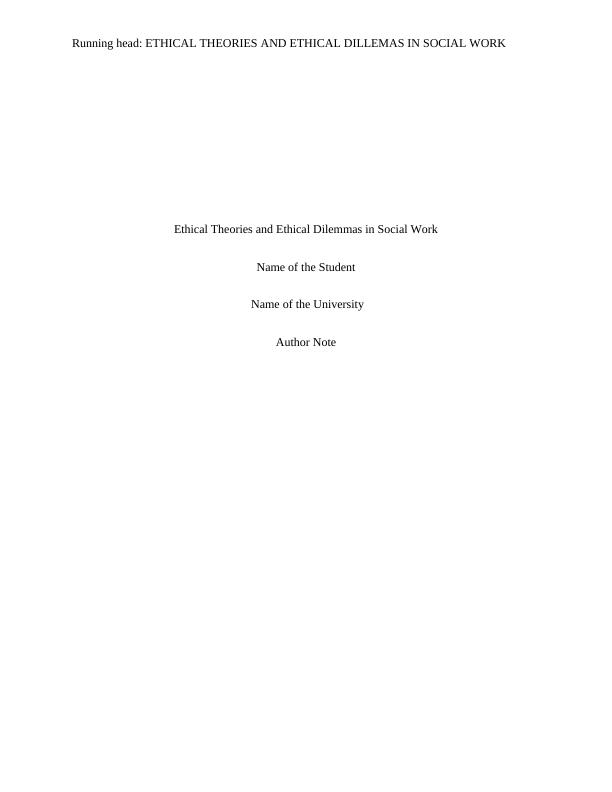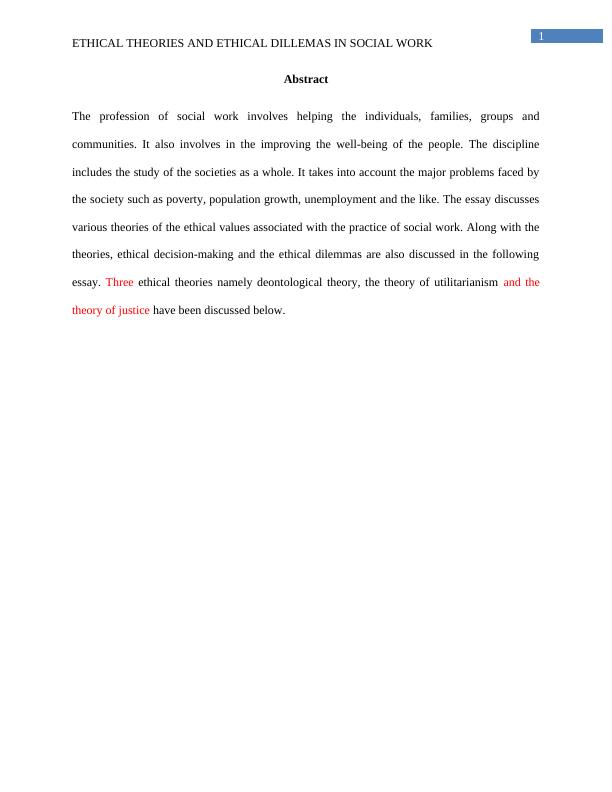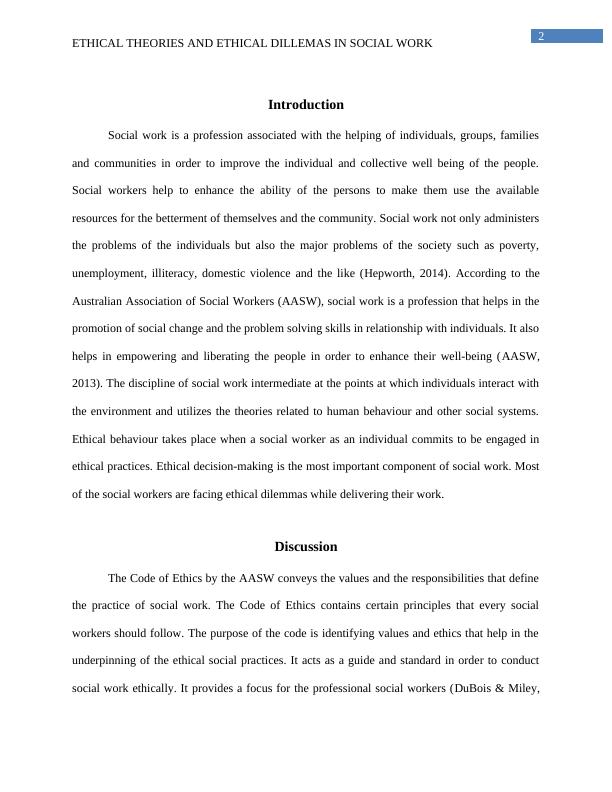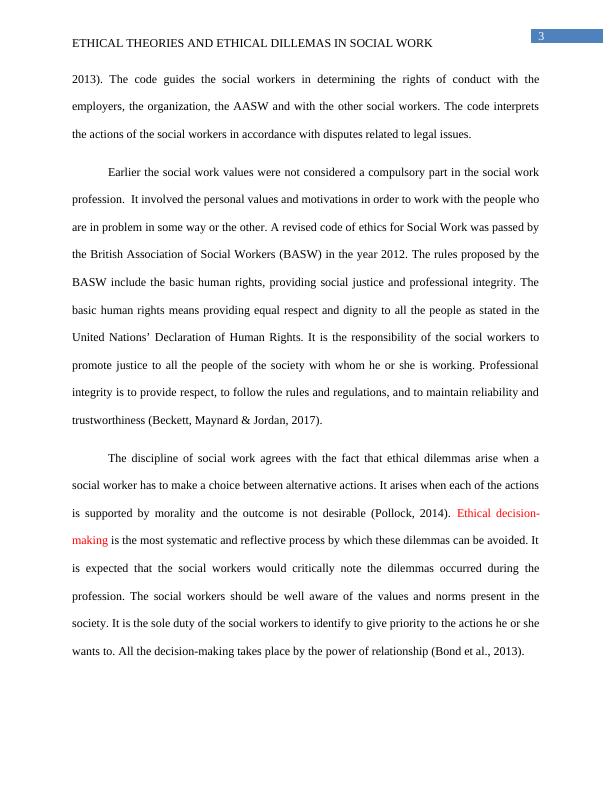Ethical Theories and Ethical Dilemmas in Social Work
Added on 2023-06-14
11 Pages3035 Words442 Views
Running head: ETHICAL THEORIES AND ETHICAL DILLEMAS IN SOCIAL WORK
Ethical Theories and Ethical Dilemmas in Social Work
Name of the Student
Name of the University
Author Note
Ethical Theories and Ethical Dilemmas in Social Work
Name of the Student
Name of the University
Author Note

1
ETHICAL THEORIES AND ETHICAL DILLEMAS IN SOCIAL WORK
Abstract
The profession of social work involves helping the individuals, families, groups and
communities. It also involves in the improving the well-being of the people. The discipline
includes the study of the societies as a whole. It takes into account the major problems faced by
the society such as poverty, population growth, unemployment and the like. The essay discusses
various theories of the ethical values associated with the practice of social work. Along with the
theories, ethical decision-making and the ethical dilemmas are also discussed in the following
essay. Three ethical theories namely deontological theory, the theory of utilitarianism and the
theory of justice have been discussed below.
ETHICAL THEORIES AND ETHICAL DILLEMAS IN SOCIAL WORK
Abstract
The profession of social work involves helping the individuals, families, groups and
communities. It also involves in the improving the well-being of the people. The discipline
includes the study of the societies as a whole. It takes into account the major problems faced by
the society such as poverty, population growth, unemployment and the like. The essay discusses
various theories of the ethical values associated with the practice of social work. Along with the
theories, ethical decision-making and the ethical dilemmas are also discussed in the following
essay. Three ethical theories namely deontological theory, the theory of utilitarianism and the
theory of justice have been discussed below.

2
ETHICAL THEORIES AND ETHICAL DILLEMAS IN SOCIAL WORK
Introduction
Social work is a profession associated with the helping of individuals, groups, families
and communities in order to improve the individual and collective well being of the people.
Social workers help to enhance the ability of the persons to make them use the available
resources for the betterment of themselves and the community. Social work not only administers
the problems of the individuals but also the major problems of the society such as poverty,
unemployment, illiteracy, domestic violence and the like (Hepworth, 2014). According to the
Australian Association of Social Workers (AASW), social work is a profession that helps in the
promotion of social change and the problem solving skills in relationship with individuals. It also
helps in empowering and liberating the people in order to enhance their well-being (AASW,
2013). The discipline of social work intermediate at the points at which individuals interact with
the environment and utilizes the theories related to human behaviour and other social systems.
Ethical behaviour takes place when a social worker as an individual commits to be engaged in
ethical practices. Ethical decision-making is the most important component of social work. Most
of the social workers are facing ethical dilemmas while delivering their work.
Discussion
The Code of Ethics by the AASW conveys the values and the responsibilities that define
the practice of social work. The Code of Ethics contains certain principles that every social
workers should follow. The purpose of the code is identifying values and ethics that help in the
underpinning of the ethical social practices. It acts as a guide and standard in order to conduct
social work ethically. It provides a focus for the professional social workers (DuBois & Miley,
ETHICAL THEORIES AND ETHICAL DILLEMAS IN SOCIAL WORK
Introduction
Social work is a profession associated with the helping of individuals, groups, families
and communities in order to improve the individual and collective well being of the people.
Social workers help to enhance the ability of the persons to make them use the available
resources for the betterment of themselves and the community. Social work not only administers
the problems of the individuals but also the major problems of the society such as poverty,
unemployment, illiteracy, domestic violence and the like (Hepworth, 2014). According to the
Australian Association of Social Workers (AASW), social work is a profession that helps in the
promotion of social change and the problem solving skills in relationship with individuals. It also
helps in empowering and liberating the people in order to enhance their well-being (AASW,
2013). The discipline of social work intermediate at the points at which individuals interact with
the environment and utilizes the theories related to human behaviour and other social systems.
Ethical behaviour takes place when a social worker as an individual commits to be engaged in
ethical practices. Ethical decision-making is the most important component of social work. Most
of the social workers are facing ethical dilemmas while delivering their work.
Discussion
The Code of Ethics by the AASW conveys the values and the responsibilities that define
the practice of social work. The Code of Ethics contains certain principles that every social
workers should follow. The purpose of the code is identifying values and ethics that help in the
underpinning of the ethical social practices. It acts as a guide and standard in order to conduct
social work ethically. It provides a focus for the professional social workers (DuBois & Miley,

3
ETHICAL THEORIES AND ETHICAL DILLEMAS IN SOCIAL WORK
2013). The code guides the social workers in determining the rights of conduct with the
employers, the organization, the AASW and with the other social workers. The code interprets
the actions of the social workers in accordance with disputes related to legal issues.
Earlier the social work values were not considered a compulsory part in the social work
profession. It involved the personal values and motivations in order to work with the people who
are in problem in some way or the other. A revised code of ethics for Social Work was passed by
the British Association of Social Workers (BASW) in the year 2012. The rules proposed by the
BASW include the basic human rights, providing social justice and professional integrity. The
basic human rights means providing equal respect and dignity to all the people as stated in the
United Nations’ Declaration of Human Rights. It is the responsibility of the social workers to
promote justice to all the people of the society with whom he or she is working. Professional
integrity is to provide respect, to follow the rules and regulations, and to maintain reliability and
trustworthiness (Beckett, Maynard & Jordan, 2017).
The discipline of social work agrees with the fact that ethical dilemmas arise when a
social worker has to make a choice between alternative actions. It arises when each of the actions
is supported by morality and the outcome is not desirable (Pollock, 2014). Ethical decision-
making is the most systematic and reflective process by which these dilemmas can be avoided. It
is expected that the social workers would critically note the dilemmas occurred during the
profession. The social workers should be well aware of the values and norms present in the
society. It is the sole duty of the social workers to identify to give priority to the actions he or she
wants to. All the decision-making takes place by the power of relationship (Bond et al., 2013).
ETHICAL THEORIES AND ETHICAL DILLEMAS IN SOCIAL WORK
2013). The code guides the social workers in determining the rights of conduct with the
employers, the organization, the AASW and with the other social workers. The code interprets
the actions of the social workers in accordance with disputes related to legal issues.
Earlier the social work values were not considered a compulsory part in the social work
profession. It involved the personal values and motivations in order to work with the people who
are in problem in some way or the other. A revised code of ethics for Social Work was passed by
the British Association of Social Workers (BASW) in the year 2012. The rules proposed by the
BASW include the basic human rights, providing social justice and professional integrity. The
basic human rights means providing equal respect and dignity to all the people as stated in the
United Nations’ Declaration of Human Rights. It is the responsibility of the social workers to
promote justice to all the people of the society with whom he or she is working. Professional
integrity is to provide respect, to follow the rules and regulations, and to maintain reliability and
trustworthiness (Beckett, Maynard & Jordan, 2017).
The discipline of social work agrees with the fact that ethical dilemmas arise when a
social worker has to make a choice between alternative actions. It arises when each of the actions
is supported by morality and the outcome is not desirable (Pollock, 2014). Ethical decision-
making is the most systematic and reflective process by which these dilemmas can be avoided. It
is expected that the social workers would critically note the dilemmas occurred during the
profession. The social workers should be well aware of the values and norms present in the
society. It is the sole duty of the social workers to identify to give priority to the actions he or she
wants to. All the decision-making takes place by the power of relationship (Bond et al., 2013).

End of preview
Want to access all the pages? Upload your documents or become a member.
Related Documents
Social Work as a Profession with Code of Ethics in Australialg...
|5
|1964
|500
Professional Decision Making: A Case Study on Ethical Issues in Social Worklg...
|9
|1841
|171
Social Work Practice: Values, Ethics, and Challengeslg...
|10
|2723
|32
Essay on Social Policy (pdf)lg...
|9
|2952
|313
Principles And Role Of Social Workerslg...
|5
|619
|11
Code of Ethics in Social Worklg...
|5
|697
|159